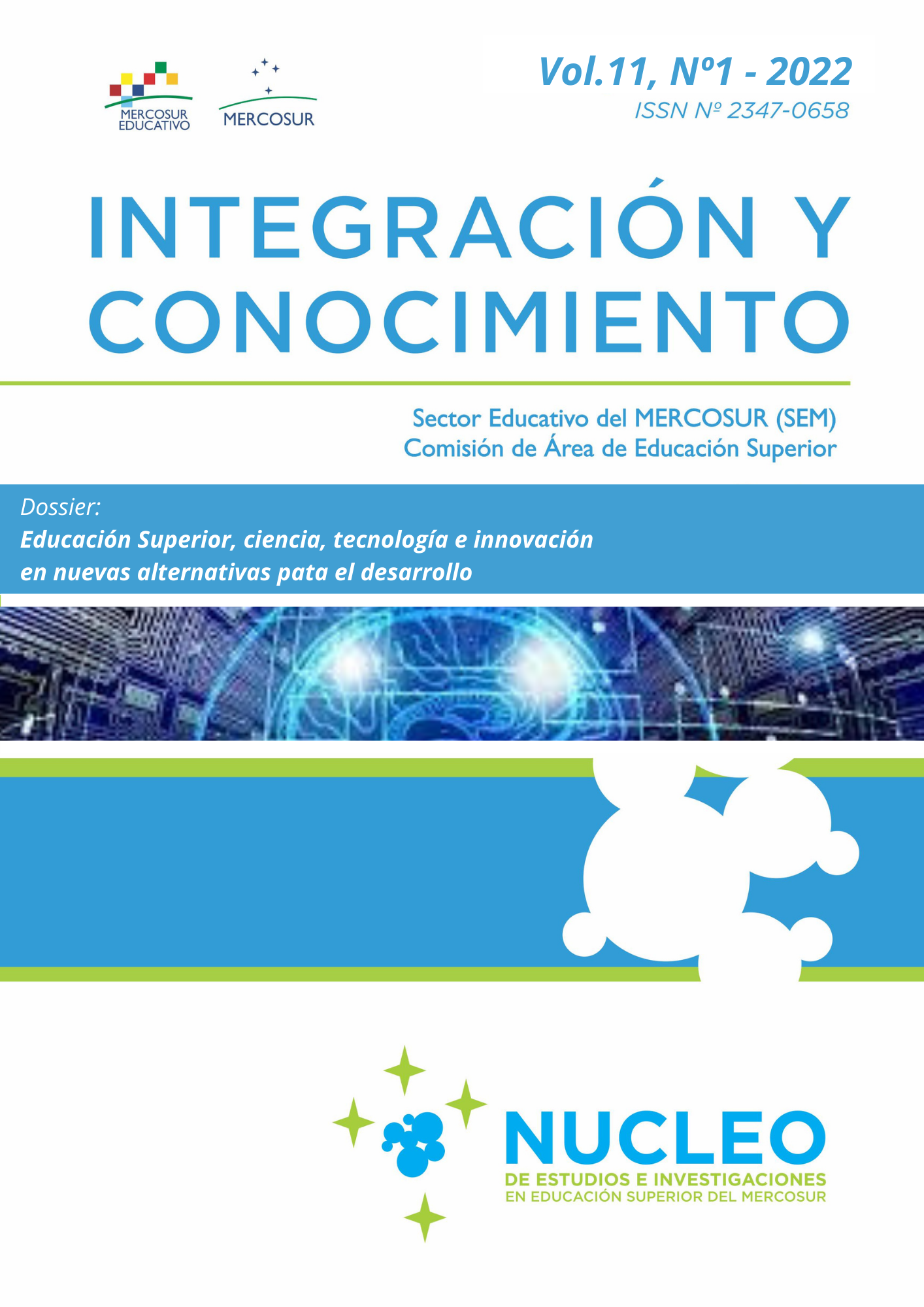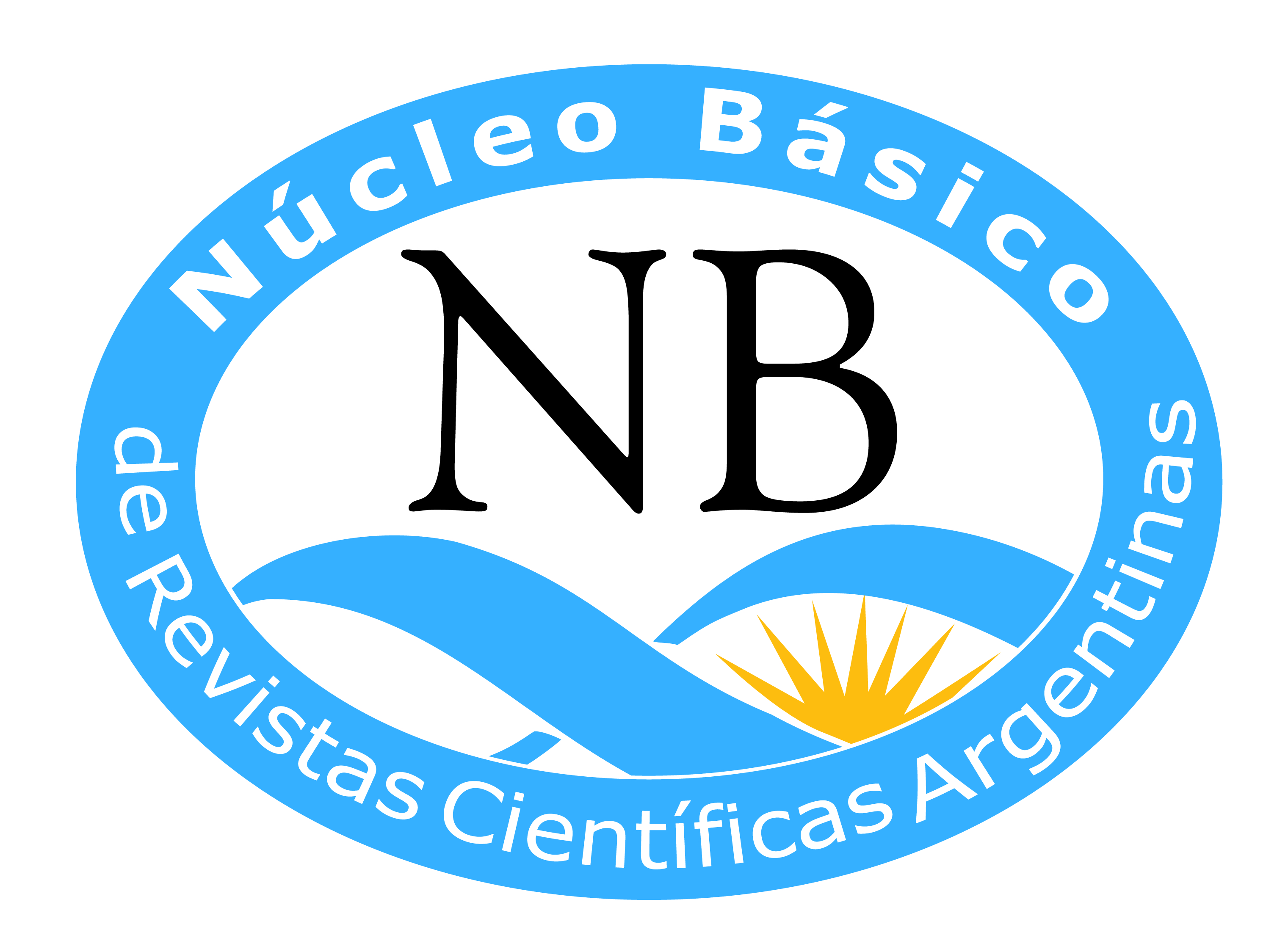Internationalisation of curriculum in argentinean universities
DOI:
https://doi.org/10.61203/2347-0658.v11.n1.36536Keywords:
internationalisation of the curriculum, case study, disciplineAbstract
A internacionalização é um processo que percorre as universidades em escala global há quarenta anos. Em particular, a modalidade mais tradicional, consubstanciada nas ações de mobilidade acadêmica, é a que tem concentrado o maior peso dos esforços institucionais e das pesquisas realizadas até o momento. Neste século, ganham relevância novas modalidades, que encontram a sua expressão mais concreta na Internacionalização do Currículo. Esta pesquisa propõe 5 dimensões de análise que permitem observar o processo de internacionalização do currículo nas universidades argentinas: contexto institucional, planos de estudos comparáveis e compatíveis, utilização de sistema de créditos, titulação conjunta e dupla titulação e ensino em língua diferente do nativo. A partir de dois casos (Universidade Nacional de San Martín e Universidade Nacional de Cuyo), analisa-se como se desenvolve este processo de internacionalização e as particularidades que assume. Um dos aspectos centrais esteve associado à tensão entre os níveis individual, disciplinar e institucional que passam pela análise de cada caso em particular, e assumem um papel importante na comparação, permitindo tirar conclusões sobre as universidades públicas argentinas e o caminho. em que o processo de internacionalização se desenvolve no sistema de ensino superior.
Downloads
References
Becher, T. (1993). Las disciplinas y la identidad de los académicos. Revista Pensamiento Universitario, 1(1), 56-77.
Beelen, J., & Leask, B. (2011). Internationalization at home on the move. Berlin: Dr. Josef Raabe Verlag.
Beneitone, P. (2019). Internacionalización del currículo: estudio de casos en universidades argentinas. [Tesis de Doctorado]. Buenos Aires: FLACSO. Sede Académica Argentina.
Bonache, J. (1999). El estudio de casos como estrategia de construcción teórica: características, críticas y defensas. Cuadernos de Economía y Dirección de la Empresa, 3(1), 123-140.
Cancino, R., Dam, L., & Jaeger, K. (2011). Policies, Principles, Practices: New Directions in Foreign Language Education in the Era of Educational Globalization. Cambridge: Cambridge Scholars Publishing.
Carson, T. (2009). Internationalizing Curriculum: Globalization and the Worldliness of Curriculum Studies. Curriculum Inquiry, 39(1), 145-148.
Caruana, V., & Hanstock, J. (2008). Internationalising the curriculum at the University of Salford: From rhetoric to reality. En C. Cashel, & A. McKenzie. (Eds.), The global university: The role of senior managers (pp. 31-35). London: DEA.
Childress, L. (2010). The Twenty-first Century University: Developing Faculty Engagement in Internationalization. New York: Peter Lang.
Clark, B. (1991). El sistema de educación superior. Una visión comparativa de la organización académica. México: Nueva Imagen. Universidad. Autónoma Metropolitana–Azapotzalco.
Clifford, V. (2009). Engaging the disciplines in internationalising the currículo. International Journal for Academic Development, 14(2), 133–143.
Clifford, V., Henderson, J., & Montgomery, C. (2013). Internationalising the curriculum for all students: The role of staff dialogue. En J. Ryan. (Ed.), Cross-cultural teaching and learning for home and international students: Internationalisation of pedagogy and curriculum in higher education (pp. 251-264). London: Routledge.
de Wit, H. & Altbach, P. (2020). Internationalization in higher education: global trends and recommendations for its future. Policy Reviews in Higher Education, 5(1), 28-46
de Wit, H., & Beelen, J. (2014). Reading between the lines: Global internationalization survey. University World News.
Didou Aupetit, S. (2014). Cograduaciones y dobles grados internacionales en América Latina: una oferta en mutación. En S. Didou, & M. Fazio. (Coords.), Titulaciones dobles y carreras compartidas en América Latina: Un estado del arte exploratorio en Argentina, Colombia y Ecuador (pp. 21-60). Caracas, Venezuela: IESALC-UNESCO.
Egron-Polak, E., & Hudson, R. (2014). Internationalization of higher education: Growing expectations, essential values. Paris: IAU.
Eisenhardt, K. M. (1989). Building Theories from Case Study Research.
Academy of Management Review, 14(4), 532-550.
Gacel-Ávila, J., (2003). La internacionalización de la educación superior: paradigma para la ciudadanía global. México: Universidad de Guadalajara.
Gacel-Ávila, J. (2006). La dimensión internacional de las universidades. Contexto. Procesos. Estrategias. México: Universidad de Guadalajara.
Gacel-Ávila, J. (2018). Educación superior, internacionalización e integración en América Latina y el Caribe. Caracas: UNESCO – IESALC y Córdoba: Universidad Nacional de Córdoba.
Green, M. F., & Shoenberg, R. (2006). Where faculty live: Internationalizing the disciplines. Washington, DC: American Council of Education.
Green, W., & Whitsed, C. (2015). Introducing Critical Perspectives on Internationalising the Curriculum. In W. Green & C. Whitsed. (Eds.), Critical Perspectives on Internationalising the Curriculum in Disciplines (3-22). Rotterdam: Sense Publishers.
Halonen, M., Ihalainen, P., & Saarinen, T. (2014). Language Policies in Finland and Sweden. Interdisciplinary and Multi-sited Comparisons. Bristol: Multilingual Matters.
Hillebrand, B., Kok, R., & Biemans, W. (2001). Theory-testing using case studies: a comment on Johnston, Leach and Liu. Industrial Marketing Management, 30(8), 651-657.
Hudzik, J. (2011). Comprehensive internationalization: From concept to action. Washington: NAFSA Association of International Educators.
Hyland, F., Trahar, S., Anderson, J. A., & Dickens, A. (2008). A changing world: the internationalisation experiences of staff and students (home & international) in UK Higher Education [Ponencia]. 'The internationalising of UK Higher Education learning and teaching: reflections on policy, practice and theory. Edinburgh, Escocia. http://escalate.ac.uk/downloads/5248.pdf
Karseth, B., & Sivesind, K. (2010). Conceptualising Curriculum Knowledge Within and Beyond the National Context. European Journal of Education, 45(1), 103-120.
Klein, J. T. (1993). Blurring, cracking, and crossing: Permeation and the fracturing of discipline. En E. Messer-Davidow, D. Sylvan, & D. Shumway. (Eds.), Knowledges: Historical and critical studies of disciplinarity (pp. 185-211). Charlottesville, VA: University Press of Virginia.
Leask, B., & Bridge, C. (2013). Comparing internationalisation of the curriculum in action across disciplines: Theoretical and practical perspectives. Compare: A Journal of Comparative and International Education, 43(1), 79–101.
Leask, B. (2015). Internationalising the curriculum. Oxford, UK: Routledge.
Luxon, T., & Peelo, M. (2009). Internationalisation: its implications for curriculum design and course development in UK higher education. Innovations in Education and Teaching International, 46(1), 51–60.
Marsh, D., & Laitinen, L. (2004). Medium of instruction in European higher education: Summary of research outcomes of European Network for Language Learning amongst Undergraduates (ENLU) Task Force 4. Jyväskylä: UniCOM, University of Jyväskylä.
Maxwell, J.A. (1998). Designing a Qualitative Study. En L. Bickman, & D. J. Rog. (Eds.), Handbook of Applied Social Research Methods (pp. 69-100). Thousand Oaks: Sage Publications.
McCutcheon, D., & M., Meredith, J. R. (1993). Conducting case study research in operations management. Journal of Operations Management, 11(1), 239-256.
Nilsson, B. (2000). Internationalising the curriculum. Internationalisation at home: A position paper, 21-27.
Rusciano, F. (2014). Globalizing the Curriculum. How to Incorporate a Global Perspective into Your Courses, Liberal Education, 100(3), 14-21.
Secretaría de Políticas Universitarias. (2015). Anuario 2015. Estadísticas Universitarias Argentinas. Buenos Aires: Ministerio de Educación.
Shohamy, E.G. (2006). Language Policy: Hidden Agendas and New Approaches. Oxford: Routledge.
Stake R. E. (1994). Case Studies. En N. K. Denzin & Y. S. Lincoln. (Eds.) Handbook of Qualitative Research (pp. 236-247). Thousand Oaks, CA: Sage Publications.
Stütz, A. Green, W., McAllister, L. & Eley, D. (2015). Preparing Medical Graduates for an Interconnected World: Current Practices and Future Possibilities for Internationalizing the Medical Curriculum in Different Contexts. Journal of Studies in International Education, 19(1), 28-45.
Turner, Y., & Robson, S. (2007). Competitive and cooperative impulses to internationalization: Reflecting on the interplay between management intentions and the experience of academics in a British university. Education, Knowledge & Economy: A Journal for Education and Social Enterprise, 1 (1), 65–82.
UNESCO-UIS. (2021). Tertiary Education Statistics. Montreal, Canadá.
Van der Walt, C. (2013). Multilingual Higher Education: Beyond English-medium Orientations. Bristol: Multilingual Matters.
Yin, R. K. (2018). Case Study Research and Applications: Design and Methods. Thousand Oaks, CA: Sage Publications.
Downloads
Published
Issue
Section
License

This work is licensed under a Creative Commons Attribution-NonCommercial-ShareAlike 4.0 International License.
Authors who have publications with this journal accept the following terms:
a. Authors shall retain their copyright and guarantee the journal the right of first publication of their work, which shall simultaneously be subject to the Creative Commons License of Recognition which allows third parties to share the work as long as its author is indicated and its first publication is this journal.
b. Authors may adopt other non-exclusive licensing agreements for the distribution of the published version of the work (e.g., depositing it in an institutional telematic archive or publishing it in a monographic volume) provided that the initial publication in this journal is indicated.
c. Authors are allowed and encouraged to disseminate their work via the Internet (e.g. in institutional telematic archives or on their website) after publication of the article, which may lead to interesting exchanges and increased citations of the published work. (See The Effect of Open Access).



